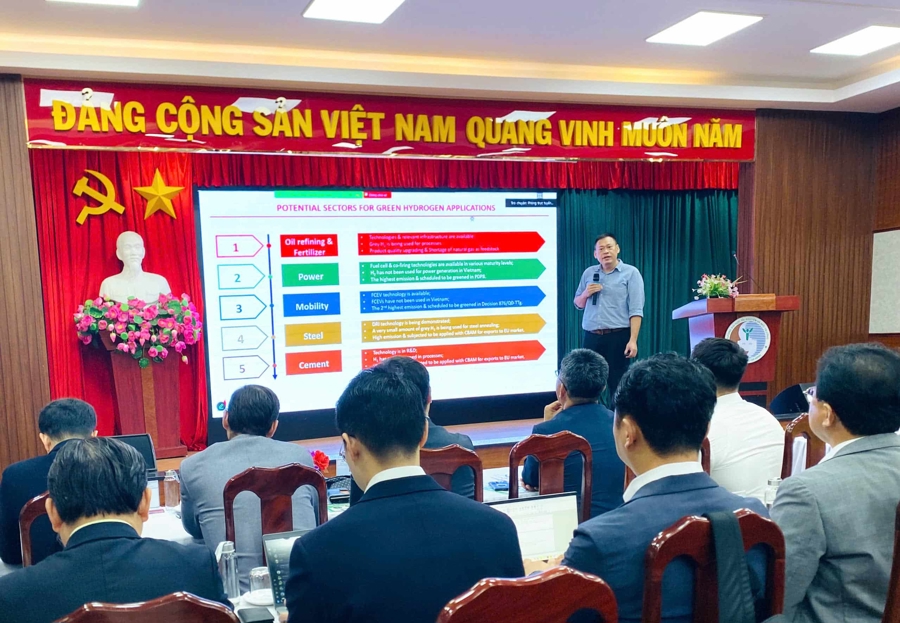Green Hydrogen in Vietnam: A Strategic Opportunity Amid Global Energy Transition
At the Vietnam–Korea Hydrogen Workshop held in Ho Chi Minh City on July 16, 2025, Dr. Nguyen Huu Luong from the Vietnam Petroleum Institute (VPI) delivered a keynote presentation titled "Green Hydrogen Development in Vietnam: Potentials and Challenges." His comprehensive, data-driven analysis provided both Vietnamese and international delegates with a realistic and ambitious perspective on how Vietnam could develop a viable green hydrogen industry within the next few decades.

Dr. Luong began his remarks by emphasizing the increasingly strategic role of green hydrogen in the global decarbonization process. Produced from renewable energy via water electrolysis, green hydrogen is emerging as a clean energy carrier, particularly relevant for hard-to-abate sectors such as steelmaking, cement production, petrochemicals, and heavy-duty transport. Hydrogen also holds promise as a medium for long-duration energy storage, helping to balance power grids dominated by intermittent sources like solar and wind.
Citing figures from IRENA, Dr. Luong noted that by mid-2024, over 70 countries had already introduced or drafted national hydrogen strategies, most of which focus on green hydrogen. This signals a global shift from vision to action, with hydrogen now at the center of energy policy and investment planning.
In Vietnam, he acknowledged that the green hydrogen journey is just beginning. Nevertheless, several important steps have already been taken. Chief among these is Decision 165/QĐ-TTg, issued in early 2024, which outlines the country's ambition to produce between 10 and 20 million tons of clean hydrogen annually by 2050. Other regulatory milestones, such as Decision 500 on the national power development plan, include hydrogen as an alternative fuel in thermal power plants and future LNG-to-hydrogen conversion.
However, Dr. Luong stressed that enthusiasm alone is not enough. The first major obstacle is economic: green hydrogen production remains costly due to high capital expenditures for electrolyzers, compression and storage infrastructure, and the lack of economies of scale. Vietnam also lacks the essential infrastructure for hydrogen distribution, including pipelines, refueling stations, and safety standards.
Another challenge is the limited size of the domestic market. While gray hydrogen is currently used in the refining and fertilizer industries, the transition to green hydrogen would require substantial capital investment and could lead to higher production costs. Without mechanisms such as carbon pricing, clean hydrogen certification, or mandatory blending requirements, demand will likely remain low in the near term.
Yet Vietnam possesses a clear comparative advantage: abundant renewable energy potential. According to VPI, the combined theoretical capacity of solar and wind energy in Vietnam could reach up to 1,400 GW—many times greater than the country's current power demand. If properly mobilized, this could form the foundation for a large-scale green hydrogen industry.
Dr. Luong outlined a phased roadmap for hydrogen market development in Vietnam. In the short term (through 2030), efforts should focus on pilot and demonstration projects, especially in public transportation (e.g., hydrogen buses), hydrogen-ammonia co-firing in power plants, and clean fertilizer production. In parallel, the country must develop a comprehensive legal and regulatory framework, covering technical standards, hydrogen certification, and investment incentives.
He also highlighted the importance of international cooperation, particularly with technology leaders like South Korea, Japan, Germany, and Norway. Vietnam can shorten its development curve by leveraging foreign expertise, technology transfer, and climate financing.
Dr. Luong concluded by reaffirming that green hydrogen is not merely an economic opportunity—it is a necessary component of Vietnam’s pathway toward net-zero emissions by 2050. To make this vision a reality, he emphasized the need for coordinated action among the government, private sector, financial institutions, and international partners to build a clean, modern, and resilient energy industry.





